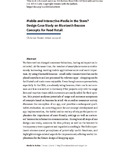Citation link:
http://dx.doi.org/10.25819/ubsi/8261Files in This Item:
| File | Description | Size | Format | |
|---|---|---|---|---|
| Reuter_Leopold_Mobile_and_interactive_media.pdf | 954.61 kB | Adobe PDF |  View/Open |
| Dokument Type: | Article | metadata.dc.title: | Mobile and interactive media in the store? | Title addition: | Design case study on Bluetooth beacon concepts for food retail | Authors: | Reuter, Christian Leopold, Inken |
Institute: | DFG-Sonderforschungsbereich 1187 "Medien der Kooperation" | Free keywords: | Bluetooth beacon, Design cases study, Food retail, Supermarket, Shopping app | Dewey Decimal Classification: | 302.23 Medien (Kommunikationsmittel), Medienwissenschaft | GHBS-Clases: | KNZZ KNZT |
Issue Date: | 2018 | Publish Date: | 2021 | Journal: | Media in action : interdisciplinary journal on cooperative media | Source: | Media in action : interdisciplinary journal on cooperative media ; 2018,1: Socio-informatics. – ISSN 2567-9082, S. 99 – 134. | Abstract: | The Internet has changed consumer behaviour, having an impact on local retail. At the same time, the number of smartphone users is continuously increasing, making mobile applications more and more important. By using Bluetooth beacons – small radio transmitters that can be placed anywhere and are processed by relevant apps – shopping can be facilitated and made more enjoyable. Even though some supermarkets, especially in the USA, are already using beacons, their use is not common and less researched in Germany. Pilot projects only refer to usage data and reaction times while customers are rarely asked for their opinion. This project analyses potentials of usage and customer acceptance of concepts based on beacons in retail via an online consumer survey, discusses the conception of an app, and provides a subsequent qualitative evaluation. As a starting point for our concept development and app implementation, the initial online survey of 203 participants emphasises the importance of user-friendly settings as well as costumers’ interest in informative communication. Throughout all steps of our design case study, concerns for data privacy as well as the interest in transparency were apparent and regarded accordingly. The field experiment stresses users’ perceptions of potentially useful functions, and highlights design-related aspects for improvement, offering useful implications for the future design of shopping apps. |
DOI: | http://dx.doi.org/10.25819/ubsi/8261 | URN: | urn:nbn:de:hbz:467-18308 | URI: | https://dspace.ub.uni-siegen.de/handle/ubsi/1830 | License: | http://creativecommons.org/licenses/by-sa/4.0/ |
| Appears in Collections: | Publikationen aus der Universität Siegen |
This item is protected by original copyright |
Page view(s)
396
checked on Jan 17, 2025
Download(s)
100
checked on Jan 17, 2025
Google ScholarTM
Check
Altmetric
This item is licensed under a Creative Commons License


